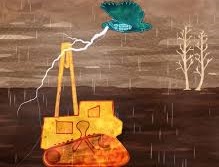MN Taxpayers Fund Controversial Anti-Pipeline Video Game
 A controversial new video game that industry critics claim supports eco-terrorism by directing players to destroy pipelines, oil trucks and other industry infrastructure was developed with $3,290 in taxpayer support from the Minnesota Arts and Cultural Heritage Fund.
A controversial new video game that industry critics claim supports eco-terrorism by directing players to destroy pipelines, oil trucks and other industry infrastructure was developed with $3,290 in taxpayer support from the Minnesota Arts and Cultural Heritage Fund.
Artist Elizabeth LaPensee, who formerly lived in Duluth, received a total of $7,000 from the Arrowhead Regional Arts Council, including an unspecified amount of taxpayer financial support from the state’s general fund.
Now a professor at Michigan State University, LaPensee maintains the “Thunderbird Strike” game was designed to empower indigenous people, not provoke violence.
But the revelation that taxpayer funds were spent on such a politically-charged project have already led a powerful state legislator to call for tighter oversight of Legacy Fund grants.
“It’s disappointing to learn that our tax dollars were used by someone who not only moved out of our state but on a project that has zero benefit to Minnesota,” said House Legacy Funding Finance Committee Chair Bob Gunther (R-Fairmont) in a statement. “Common sense would tell you our arts dollars should be spent on programs that serve some purpose to the State of Minnesota, not on an out-of-state video game that blows up oil pipelines.”
The video game recently premiered at an indigenous festival in Toronto, receiving a rave review on the website Motherboard under the headline “Destroy Oil Pipelines as a Thunderbird in this new video game.”
In Thunderbird Strike, a new side-scrolling game that launches at the ImagineNATIVE festival this week in Toronto, players can control a thunderbird—a symbol in several Indigenous cultures—that destroys as much of the oil industry’s machinery and pipelines as it possibly can. And it’s so satisfying.
LaPensee told the reviewer that she hopes the game generates support for the removal of the Enbridge 5 pipeline that carries oil across Canada to the Great Lakes.
“Especially when we’re talking in the context of pipelines, and the oil industry, there are some wins we can have. But ultimately protectors will be pushed out and the processes are going to move forward. It’s happening with mining and it’s happening with pipelines.”
But the controversy comes at a sensitive time in the pipeline permitting process in Minnesota for the $2.6 billion Enbridge 3 replacement line. Two public hearings on the project were cancelled on Thursday in St. Cloud due to “logistical and safety issues,” just days after a Duluth hearing was disrupted and shut down by pipeline opponents.
Industry representatives told MPR they worry the game could give some participants the wrong idea.
Toby Mack, president of the Energy Equipment and Infrastructure Alliance, said his group is concerned the game could inspire users to do damage to actual pipeline infrastructure.
“We don’t think there’s any place for this kind of material being out there,” he said. “The consequences of somebody committing an act such as you can on the video game is just horrific.”

Yet the top official at the Arrowhead Regional Arts Council has no second thoughts about awarding taxpayer funds to the anti-pipeline activist.
Executive Director Drew Digby said the remainder came from the state general fund, and a grant from the McKnight Foundation. He said he stands by the grant, awarded to a rising star in the Duluth Native American art scene with great credentials.
“She did exactly what she told us she was going to do,” Digby said. “And unless we wanted to get into examining the political sides of every artist, that’s just a rabbit hole that I don’t think anybody wants the state to get into.”
The video game can be downloaded free at the Thunderbird Strike website, where LaPensee makes sure Minnesota taxpayers get the credit they deserve for their generosity in supporting her cause.
“This activity is made possible in part by the voters of Minnesota through a grant from the Arrowhead Regional Arts Council, thanks to appropriations from The McKnight Foundation and the Minnesota State Legislature’s general and arts and cultural heritage funds.”